- Home
- Carolyn Keene
The Case of the Photo Finish Page 9
The Case of the Photo Finish Read online
Page 9
“No, this isn’t usual,” Nancy said, replying to Willy’s question. “As a matter of fact, I’m not sure what Eric and Steve are doing here at all. I don’t think anybody invited them.”
She hadn’t meant for Eric to overhear her, but her words must have carried farther than she had intended them to. Eric grinned at her, and said “We’re just covering the games, Nancy.”
Making her an exaggerated bow, he stepped to one side to get a better angle on Cheryl smiling at Carson Drew.
“He goes too far,” Willy muttered. “Cheryl should never have said she would allow this project. He is only using her for his own purposes. The medals she wins and the times she turns in are the only publicity she needs.”
“It must be nice to see a photo of yourself crossing the finish line, though,” Nancy commented. “And to know that lots of other people saw it, too.”
Willy shrugged. “Nice, perhaps,” he said. “But the experience itself and the knowledge of what you have done—that should be enough.”
Still, camera lights continued to flash for the remainder of the evening. When the dessert arrived, everyone began to clap. George’s mother had ordered a big oval cake decorated to look like an athletic field, complete with running track, a pole-vaulting setup, and even an array of tiny hurdles.
Carson Drew stood up. “No long speeches,” he said. “I promise. But I can’t let the evening end without saying how happy all of us in River Heights are that you remarkable young people have come here to share your talents and dedication with us. Thank you.”
When the applause died down, Willy glanced around the table at his fellow athletes, then stood up in turn. “It is for us to thank you,” he said, “for taking us into your homes, for giving us a chance to try ourselves against one another, for allowing us to see something of your wonderful country, and most important”—he paused and looked across the table at Cheryl—“to give us the chance to make wonderful new friends. We will not forget our visit here.”
As everyone clapped and cheered, Eric and Steve were jockeying for the best camera angles. “Okay, buddy,” Steve said. “You’ve been on my case for two days now, and I’ve had enough!”
Eric whirled and said, “Yeah? Too bad you can’t use a camera as well as you use your mouth!”
Carson stood up again and said, “May I remind you gentlemen that this is a private party? It might be better if you were to leave now—and quietly.”
Steve and Eric looked at each other, then glanced around the room at the disapproving faces of the others. After an awkward pause, they each muttered, “Sorry,” and headed for the door.
Mrs. Fayne cut the cake and started passing slices around, but the fight between Eric and Steve had taken some of the fun out of the dinner. As soon as everyone had finished the cake, George said, “I think we ought to break up early. These guys have a meet tomorrow, after all.”
Steve and Eric were waiting for them outside the restaurant door, and Nancy was glad to see her father give them a friendly smile. He had been right to ask them to leave, but there was no point in starting a feud. There was already enough fighting going on in this group!
“Willy?” Nancy said when they reached the parking lot. “Can we give you a ride?”
“Thank you,” he said, taking Cheryl’s hand.
“Marta, Helga?” George called. The Faynes had parked next to Nancy’s father. “You can come in back with me.”
“Ramsay and Annelise are coming with us,” Bess announced. “And Marie-Laure, of course.”
Nancy realized with a guilty start that she had barely said more than a hello to the young French girl all evening. She was about to go over to her when Mr. Fayne exclaimed, “Oh, no, not again! The car won’t start.”
He climbed out with a flashlight in his hand and raised the hood. Nancy went over and peered down at the engine. “Do you know what the problem is?” she asked.
“Not really,” he grumbled. “It must be something electrical, but no one has been able to track it down. Usually it just seems to fix itself.”
“Mr. Fayne?” said Willy. “Would you mind to let me look at it? I know something about automobiles.”
“I’d be grateful,” Mr. Fayne said.
Willy took the flashlight from Mr. Fayne and he began to pull and push at the tangle of wires.
Nancy watched curiously. Willy certainly seemed to know his way around cars. Could he have been the one who had sabotaged her Mustang? Eric and Annelise had also gathered around. Nancy heard Annelise give Willy some suggestions about what might be wrong. She was about to join them when Bess came over with Marie-Laure. As Nancy chatted with them, she kept glancing at the group bent under the Faynes’ hood but didn’t have a chance to watch closely.
“Try the engine now,” Willy suggested after a few minutes.
Mr. Fayne got in and turned the key. The engine caught at once.
Willy was just closing the hood of the car when suddenly Eric said in alarm, “My bag! Where’s my camera bag?”
Nancy hurried over to him. “Where did you leave it?”
“On the ground, next to my motorcycle.” He was looking frantically from side to side. “I put it down when you guys came out of the restaurant, and now it’s gone. All my equipment is in it—everything!”
“Don’t worry,” Nancy said. “No one’s been in the parking lot except us. It’s bound to be around here somewhere.” Unless someone in the group took it on purpose, Nancy added to herself. She looked quickly toward Helga and Marta, who were standing quietly at the side of the Faynes’ car. “We’ll all help you look,” she told Eric.
Nancy borrowed Mr. Fayne’s flashlight and bent down to look underneath the nearest cars. All she found were a couple of discarded soda cans. Straightening up again, she headed toward the dark shadows of the surrounding shrubbery.
“Here,” Annelise’s voice called from beyond one of the nearby cars. “Is this it?”
She appeared with a canvas-and-leather bag in her hands, and Eric ran over to her. “Hey, I really don’t know how to thank you,” he said.
“It was nothing,” she replied, handing him the bag.
“Where did you find it?” asked Nancy.
Annelise pointed. “It was under one of those bushes, but the strap was still in sight. That is what led me to it.”
“I don’t think it got there by accident,” Nancy said. “Eric, you’d better check—”
“Oh, no!” he wailed, staring down into the open bag. “My film. It’s gone!”
“Don’t worry,” Carson Drew said. “You can buy more first thing in the morning, before the games begin.”
“You don’t understand,” Eric said, his voice shrill. “This was exposed film. I was planning to mail it to the processors tomorrow.”
“You mean—” Nancy began.
“I’m finished.” Eric pounded his fist against his forehead. “Wiped out! Every color shot I’ve taken in the last two days is gone!”
15
Race for the Gold
“Are you sure, Eric?” Nancy asked. “Could you have left the film at home and then forgotten about it?”
“I’m sure, all right,” he replied. “It was in there fifteen minutes ago when I changed lenses, and it’s not there now. And I know who to blame, too.”
Pushing past Nancy and her father, he strode over to Steve, who was standing talking to Marta and George. He grabbed Steve by the shoulder and spun him around.
“Where is it, you dirty thief?” Eric demanded. “What did you do with my film?”
“Get your hands off me!” Steve scoffed, pushing Eric away. “I never touched your film!”
“You knew you couldn’t win the contest fair and square, right?” Eric continued, his fists clenched. “So you cheated and stole instead. I ought to flatten your nose!”
“Eric,” Nancy said calmly, taking his elbow. “Getting into a fight isn’t going to help you find the missing pictures.”
Willy had stepped in between
the two photographers and was talking in a low voice to Steve, who said, “You think I’m going to let him call me names like that?”
Willy kept talking, and finally Steve said, “Okay, okay!” He took a step forward and said, “Listen, Eric, I didn’t steal your film, and I’m sorry it’s gone.” He took his camera bag and opened it so Eric could see its contents. “Here. Take a look if you don’t believe me.”
Nancy handed Eric the flashlight. He looked in the bag, but his film wasn’t there. “If I was wrong in saying you did it, I’m sorry,” he said grudgingly. “But I’m warning you, I still mean to win the Athletics Weekly contest. I have all my black-and-white shots in a safe place, and some of them would knock your socks off!”
The tension had eased, and once again everyone began to get ready to leave.
Nancy went over to Eric and took him aside. “What exactly was on those rolls?” she asked.
“I told you, all the color shots I’ve taken since arriving in River Heights.”
Nancy thought quickly. That meant the rolls he’d shot during the ceremony at City Hall were gone—including any pictures of someone pushing Cheryl off the stands. “Would the missing pictures include Cheryl winning the hundred-meter sprint today?” she asked. “Could you have gotten a picture of someone doing something they shouldn’t?”
Eric shook his head. “No. I’m planning to shoot tomorrow’s final with high-speed color film, but today I used black-and-white.”
“What about this morning, at the swimming pool? I remember you were using two cameras. Was one of them loaded with color?”
“Sure,” he replied.
“Did you take any pictures just before the lights went out? Is there any chance you got a shot of the person who turned them off? That would be solid proof of who’s been harassing Cheryl.”
Eric thought for a moment, then shook his head. “Nope,” he said. “No way. I remember I was focusing on Cheryl, hoping to get her in middive. I had my back to the entrance at that point.”
“Oh, well.” Nancy sighed. “It was an idea, anyway.”
“Maybe this is just more harassment,” Eric said. “Maybe somebody simply doesn’t want Cheryl to have the kind of publicity she’d get if I win the contest.”
“Nancy?” Carson Drew called from the car. “We have to go.”
“Right, Dad,” she replied. “Okay, Eric, thanks. And don’t worry too much. I have a feeling that you’ll get your film back.”
“I hope so,” he said in a gloomy voice. “There are a lot of shots I’d hate to lose. See you tomorrow.”
A few minutes later, Nancy waved goodbye and then got into her father’s car. Carson Drew pulled up in front of the house where Willy was staying.
“I’ll get out here, too,” Cheryl said, “and walk back later.”
“Are you sure you know the way?” Mr. Drew asked.
“I still have my map,” she replied. “Don’t worry, I won’t be very long. Remember, I’m in training.”
“All right,” Nancy’s father said. “But be careful walking home. We’ll leave the front door open. Be sure to lock it after you come in.
After she and her father returned home, Nancy sat down at the desk in her room and made up a chart. Down the left margin she wrote the names of all the people who had any connection with the case: Helga, Marta, Cheryl, Barbara, Steve, Eric, Ramsay, Willy, and Annelise.
Across the top she listed all the important incidents, beginning with Cheryl’s near-fall from the stands during the welcoming ceremony at. City Hall and ending with the theft of Eric’s undeveloped film.
Next Nancy began to fill in the boxes on the chart. For each incident, all of the people got a check if they could have been responsible for it, an X if they couldn’t have, or a question mark if she wasn’t sure. She had planned to circle the boxes where she didn’t know what to put, but to her surprise, there weren’t any. She knew more about everyone’s whereabouts and actions than she had realized.
Once she completed the chart, she sat back and examined it closely. Whom could she eliminate? Ramsay, certainly; he hadn’t been anywhere nearby during some of the major incidents. What about Steve? He had several check marks. For that matter, Cheryl, Marta, Helga, Eric, Barbara, Willy, and Annelise all had some X’s, too.
Nancy tossed her ballpoint down on the desk in disgust. The only thing the chart proved was that there were plenty of suspects! To make matters worse, if more than one person was involved—if, for instance, Cheryl was harassing Marta and Helga was harassing Cheryl—then no one person could be eliminated just because he or she couldn’t have committed all the tricks. She hoped the magazine George had would provide some concrete proof, but she wouldn’t know that until the next morning.
A yawn that felt as if it would crack her jaw reminded Nancy that she had been up and active since daybreak. After taking another long look at the chart, she put it away and started getting ready for bed.
• • •
The following morning, the weather was perfect—sunny and clear, with just enough of a breeze to keep it from being too warm. For a moment, Nancy turned her face up toward the sun, eyes closed. Then a burst of applause from the stands called her back to reality. A hurdles race had just ended. Even before the results were announced, a dozen uniformed aides scurried onto the track to remove the hurdles and prepare the track for the next event.
“Oh, there you are,” Barbara said, coming up to Nancy. “I was looking for you. I hear from Steve that I missed a pretty exciting evening last night.”
“I guess you could say that,” Nancy replied. “How are you doing?”
“My interviews are going pretty well but the reason I was looking for you . . .” She paused to clear her throat, looking embarrassed. “You know that story I passed along to you yesterday?”
“About Helga and the Olympics, you mean?” Nancy leaned forward.
“Uh-huh. I thought it was a terrific story, especially the way it tied in to what’s been going on here. So I’ve been going around talking to people, trying to dig up more material.” She fell silent.
“And?” Nancy prodded.
“And it looks like it’s just a lot of nasty gossip,” Barbara admitted. “The guy who told me about the accusations—the sportswriter? He seems to have a long-standing grudge against Helga. I couldn’t find out why.”
“But what about the accusations themselves?” asked Nancy.
“The word is that they were made by a runner whose father is a very important politician in her home country. Apparently, she’s not much of an athlete, but the others on her team, including the coach, were very eager to find excuses for her poor showing. The accusation against Helga was one of the things they came up with.”
“I see,” Nancy said, disappointed. That meant the case was just as open-ended as ever. Excusing herself, Nancy set off across the field to look for George. She must have arrived by now with the magazine, but Nancy hadn’t seen her yet.
She turned in surprise as a hand touched her arm. “Just the person I’m looking for,” Nancy said, smiling.
“I just got here,” George explained. “I stayed home until after Helga and Marta left. I didn’t want to take the chance of them seeing me with their magazine.”
“Do you have it with you?” Nancy asked.
George patted her oversize shoulder bag. “Right here.” George reached into her bag, pulled out the magazine, and handed it to Nancy. On the cover was a dynamic color photo of four men charging down a track, knees high and arms pumping like mad. Across the top, in big red letters, were the words Der Läufer.
Nancy thumbed through to page twenty-three. Just as George had said, the page had been torn out, so roughly and hastily that a large corner of the photo of Cheryl still clung to the center of the magazine.
Nancy stared at it. “But—” she began. Then she thrust the magazine back into George’s hands, opened her own shoulder bag, and found the brown envelope that contained the previous day’s threatening notes. �
��Look at this,” she told George.
“It’s the same, all right,” George said, “I guess that proves it.”
“If it proves anything, it proves that Helga and Marta are innocent,” Nancy proclaimed. “This photo was neatly cut from the magazine with a pair of scissors, not torn out. And this corner of the picture is still inside Marta’s copy.”
George stared at Nancy. “Then who—”
“Someone else who had a copy of the magazine,” Nancy cut in. “Someone like Eric, who got a copy because his photo was in it. Or any of the German-speaking runners could have brought a copy.”
“And anyone else might have stolen it from them,” George pointed out, “if they wanted a picture of Cheryl and knew one was in it.”
Nancy pounded her thigh with her fist. “Every time I think I’m starting to get somewhere with this case, the evidence turns out to point fourteen different ways instead of one! And the awful part is, I’m sure I’m forgetting or overlooking something crucial. It’s right here”—she tapped her temple—“but I just don’t know what it is.”
“It’ll come to you, Nancy,” George remarked. “It always does.”
“Hey, listen!” Nancy said excitedly. “The announcer is calling the finals of the girls’ hundred-meter sprint. That’s Cheryl’s and Marta’s big race. Come on!”
Nancy hurried across the field toward the starting line, with George close behind her. The finalists were already starting to take off their warm-up suits. After the uniform white suits, it was almost a shock to see jerseys and shorts in a rainbow of colors.
Nancy stopped so suddenly that George bumped into her. “Pink,” Nancy muttered to herself, looking at Cheryl’s pink running shorts. “Pink . . . and white. Of course! I’m an idiot!”
George looked at her as if she were crazy, but Nancy paid no attention. Looking quickly toward the track, Nancy saw that the runners were moving toward the starting blocks. Even from twenty feet away, Nancy could sense the tension between Cheryl and Marta.
“Come on!” Nancy cried, dragging George by the arm. “Let’s get down to the finish line before it’s too late!”

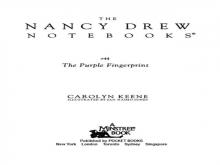 The Purple Fingerprint
The Purple Fingerprint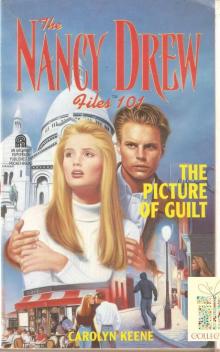 The Picture of Guilt
The Picture of Guilt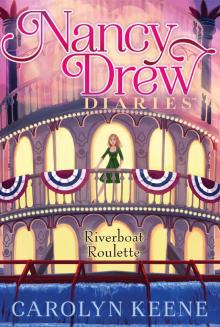 Riverboat Roulette
Riverboat Roulette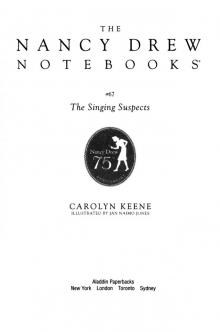 The Singing Suspects
The Singing Suspects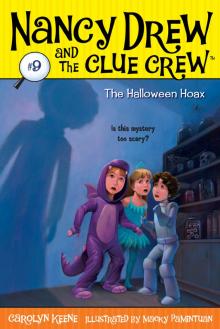 The Halloween Hoax
The Halloween Hoax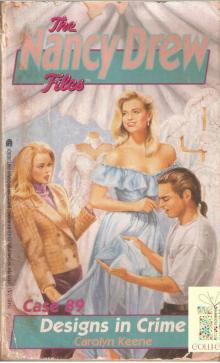 089 Designs in Crime
089 Designs in Crime The Hidden Treasures
The Hidden Treasures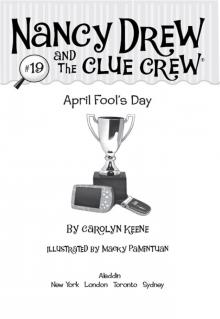 April Fool's Day
April Fool's Day The Black Widow
The Black Widow Final Notes
Final Notes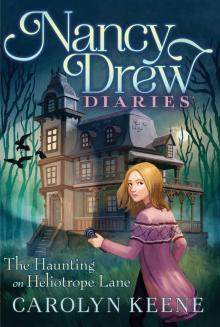 The Haunting on Heliotrope Lane
The Haunting on Heliotrope Lane The Runaway Bride
The Runaway Bride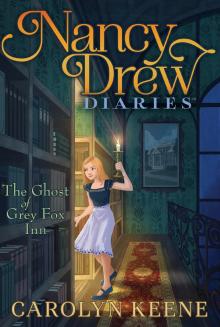 The Ghost of Grey Fox Inn
The Ghost of Grey Fox Inn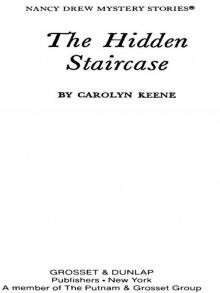 The Hidden Staircase
The Hidden Staircase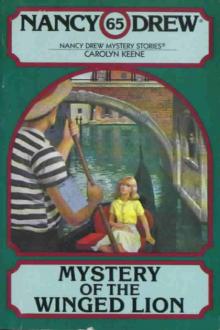 Mystery of the Winged Lion
Mystery of the Winged Lion Over the Edge
Over the Edge The Circus Scare
The Circus Scare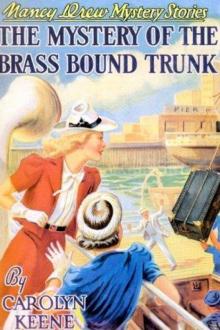 The Mystery of the Brass-Bound Trunk
The Mystery of the Brass-Bound Trunk Ski School Sneak
Ski School Sneak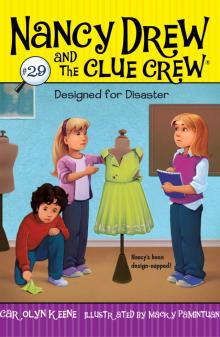 Designed for Disaster
Designed for Disaster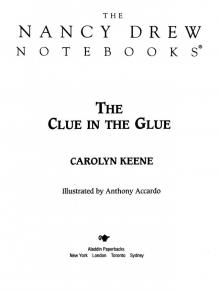 The Clue in the Glue
The Clue in the Glue Cold as Ice
Cold as Ice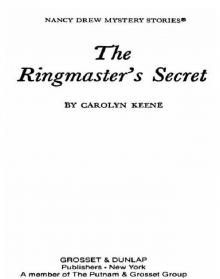 The Ringmaster's Secret
The Ringmaster's Secret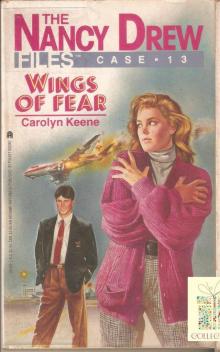 013 Wings of Fear
013 Wings of Fear The Secret of Shadow Ranch
The Secret of Shadow Ranch Not Nice on Ice
Not Nice on Ice Earth Day Escapade
Earth Day Escapade Mystery of Crocodile Island
Mystery of Crocodile Island The Bungalow Mystery
The Bungalow Mystery Power of Suggestion
Power of Suggestion The Lemonade Raid
The Lemonade Raid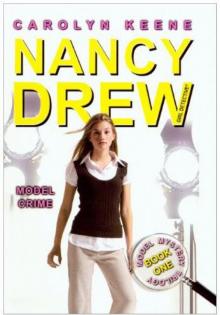 Model Crime
Model Crime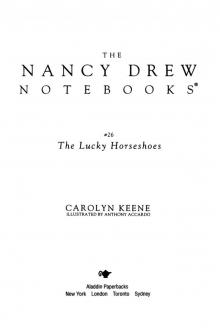 The Lucky Horseshoes
The Lucky Horseshoes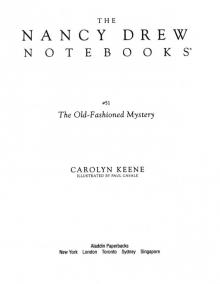 The Secret of the Old Clock
The Secret of the Old Clock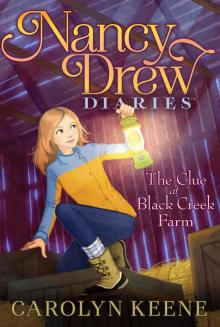 The Clue at Black Creek Farm
The Clue at Black Creek Farm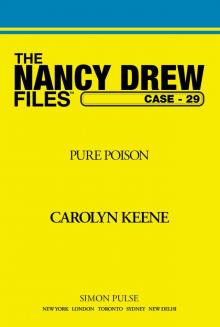 Pure Poison
Pure Poison Nobody's Business
Nobody's Business Wrong Track
Wrong Track Chick-Napped!
Chick-Napped!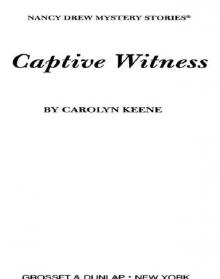 Captive Witness
Captive Witness If Looks Could Kill
If Looks Could Kill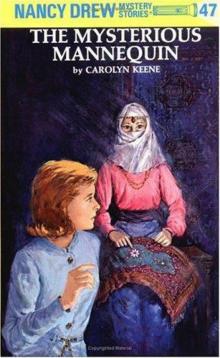 The Mysterious Mannequin
The Mysterious Mannequin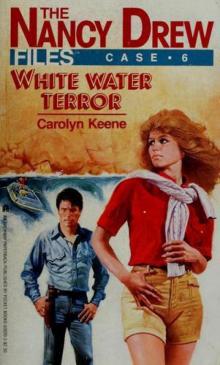 White Water Terror
White Water Terror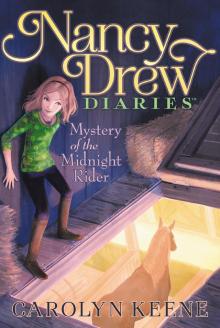 Mystery of the Midnight Rider
Mystery of the Midnight Rider Space Case
Space Case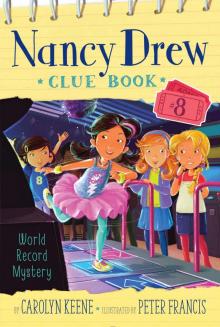 World Record Mystery
World Record Mystery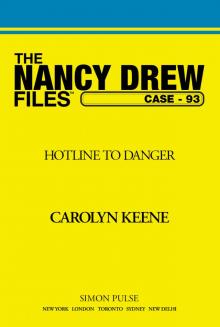 Hotline to Danger
Hotline to Danger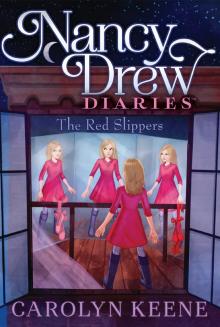 The Red Slippers
The Red Slippers A Crime for Christmas
A Crime for Christmas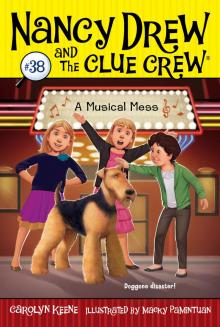 A Musical Mess
A Musical Mess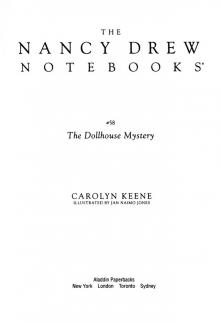 The Dollhouse Mystery
The Dollhouse Mystery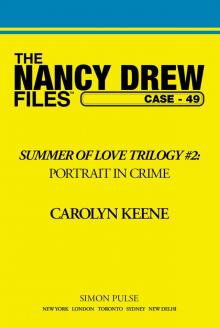 Portrait in Crime
Portrait in Crime The Message in the Haunted Mansion
The Message in the Haunted Mansion Playing With Fire
Playing With Fire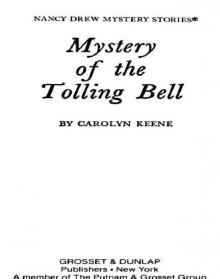 Mystery of the Tolling Bell
Mystery of the Tolling Bell Cutting Edge
Cutting Edge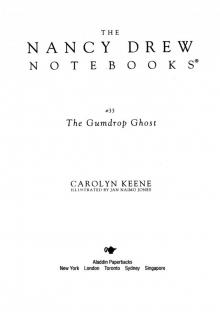 The Gumdrop Ghost
The Gumdrop Ghost The Message in the Hollow Oak
The Message in the Hollow Oak Trial by Fire
Trial by Fire Mystery at Moorsea Manor
Mystery at Moorsea Manor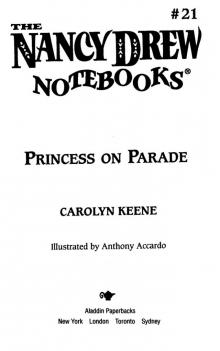 Princess on Parade
Princess on Parade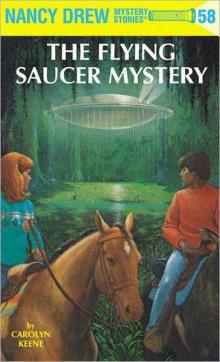 The Flying Saucer Mystery
The Flying Saucer Mystery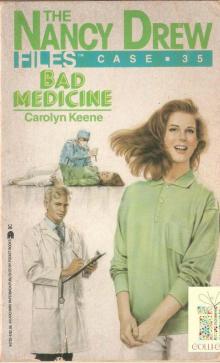 035 Bad Medicine
035 Bad Medicine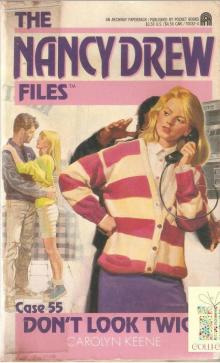 055 Don't Look Twice
055 Don't Look Twice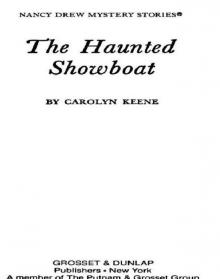 The Haunted Showboat
The Haunted Showboat Out of Bounds
Out of Bounds Choosing Sides
Choosing Sides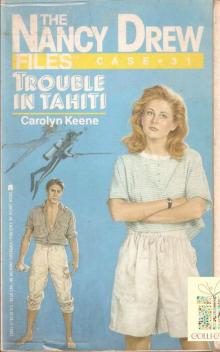 031 Trouble in Tahiti
031 Trouble in Tahiti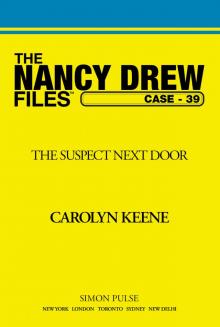 The Suspect Next Door
The Suspect Next Door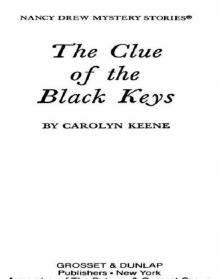 The Clue of the Black Keys
The Clue of the Black Keys The Secret Santa
The Secret Santa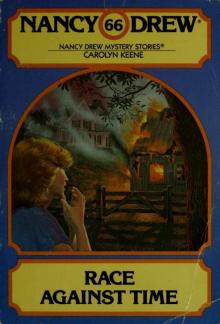 Race Against Time
Race Against Time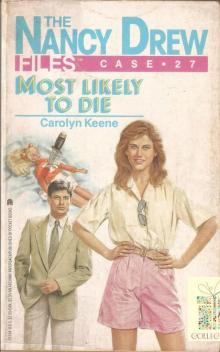 027 Most Likely to Die
027 Most Likely to Die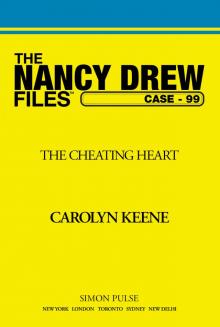 The Cheating Heart
The Cheating Heart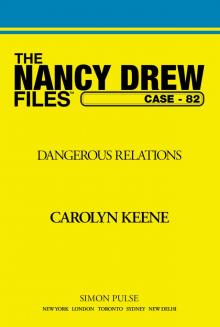 Dangerous Relations
Dangerous Relations It's No Joke!
It's No Joke!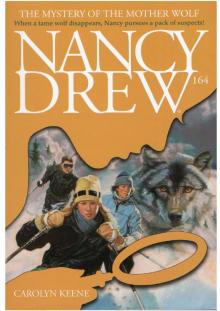 The Mystery of the Mother Wolf
The Mystery of the Mother Wolf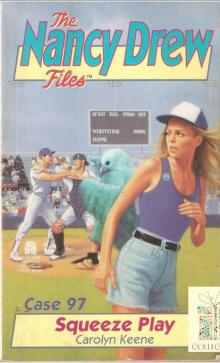 097 Squeeze Play
097 Squeeze Play Secret at Mystic Lake
Secret at Mystic Lake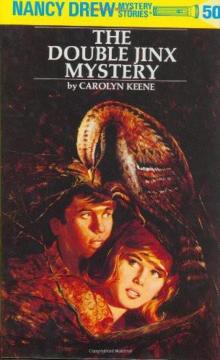 The Double Jinx Mystery
The Double Jinx Mystery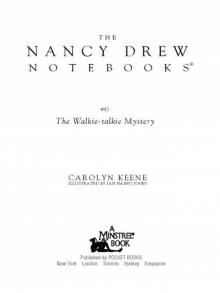 The Walkie Talkie Mystery
The Walkie Talkie Mystery The Case of the Vanishing Veil
The Case of the Vanishing Veil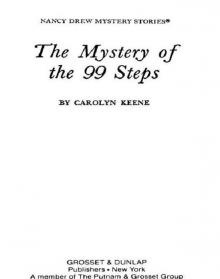 The Mystery of the 99 Steps
The Mystery of the 99 Steps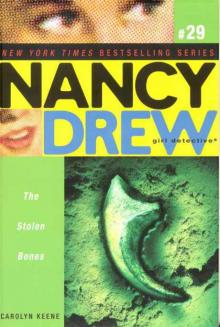 The Stolen Bones
The Stolen Bones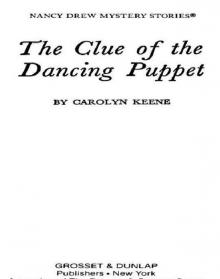 The Clue of the Dancing Puppet
The Clue of the Dancing Puppet The Sand Castle Mystery
The Sand Castle Mystery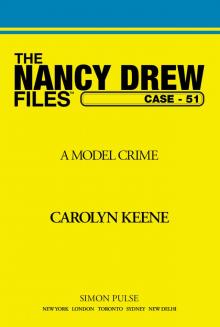 A Model Crime
A Model Crime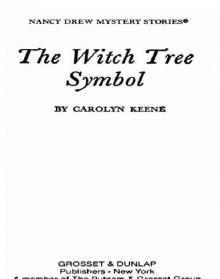 The Witch Tree Symbol
The Witch Tree Symbol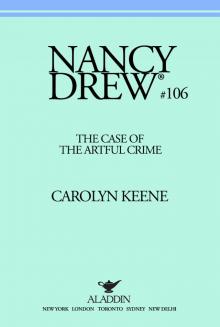 The Case of the Artful Crime
The Case of the Artful Crime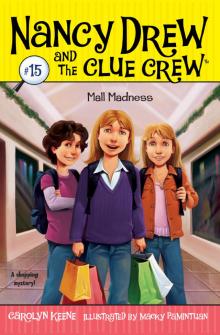 Mall Madness
Mall Madness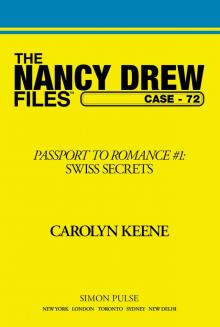 Swiss Secrets
Swiss Secrets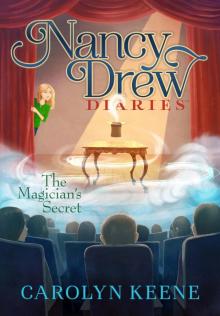 The Magician's Secret
The Magician's Secret Tall, Dark and Deadly
Tall, Dark and Deadly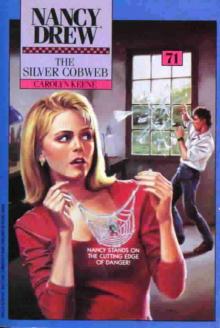 The Silver Cobweb
The Silver Cobweb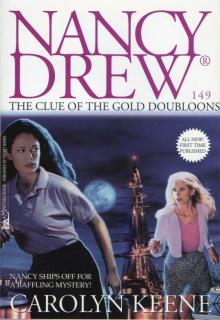 The Clue of the Gold Doubloons
The Clue of the Gold Doubloons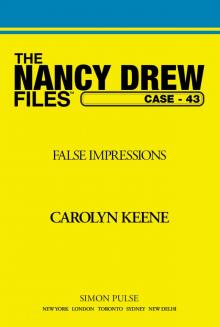 False Impressions
False Impressions Model Suspect
Model Suspect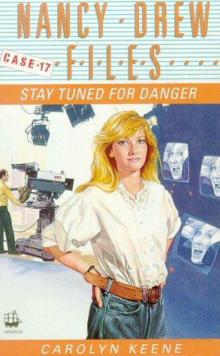 Stay Tuned for Danger
Stay Tuned for Danger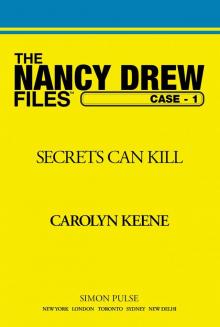 Secrets Can Kill
Secrets Can Kill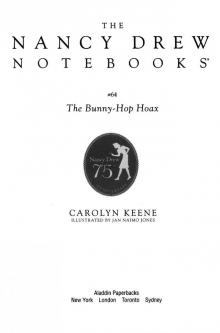 The Bunny-Hop Hoax
The Bunny-Hop Hoax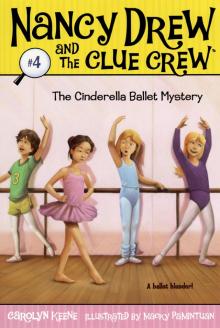 The Cinderella Ballet Mystery
The Cinderella Ballet Mystery The Secret at Solaire
The Secret at Solaire Trash or Treasure?
Trash or Treasure? The Missing Horse Mystery
The Missing Horse Mystery The Lost Locket
The Lost Locket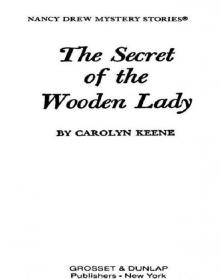 The Secret of the Wooden Lady
The Secret of the Wooden Lady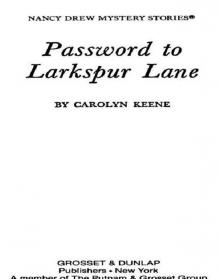 Password to Larkspur Lane
Password to Larkspur Lane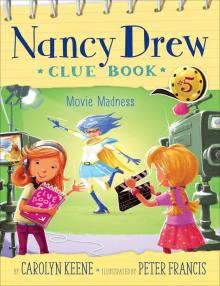 Movie Madness
Movie Madness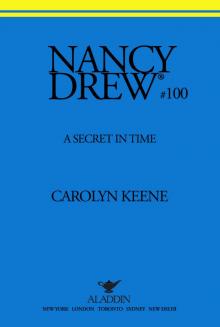 A Secret in Time
A Secret in Time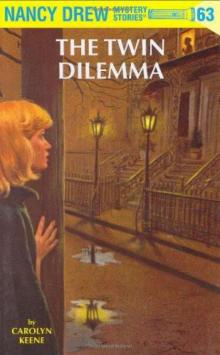 The Twin Dilemma
The Twin Dilemma Candy Is Dandy
Candy Is Dandy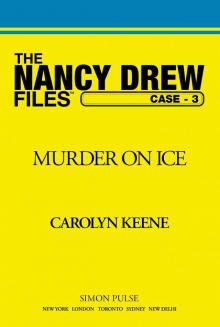 Murder on Ice
Murder on Ice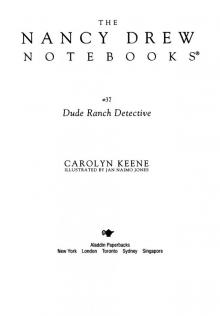 Dude Ranch Detective
Dude Ranch Detective The Slumber Party Secret
The Slumber Party Secret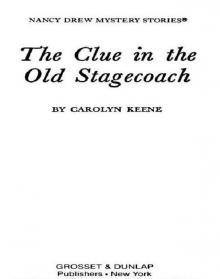 The Clue in the Old Stagecoach
The Clue in the Old Stagecoach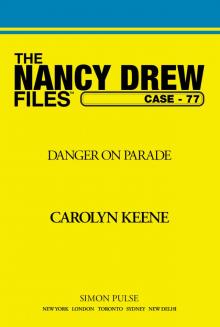 Danger on Parade
Danger on Parade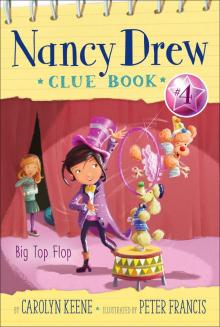 Big Top Flop
Big Top Flop Strangers on a Train
Strangers on a Train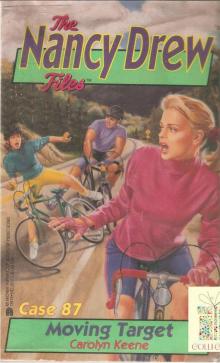 087 Moving Target
087 Moving Target The Scarytales Sleepover
The Scarytales Sleepover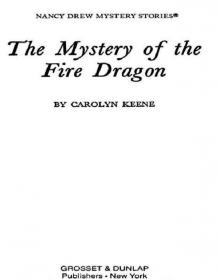 The Mystery of the Fire Dragon
The Mystery of the Fire Dragon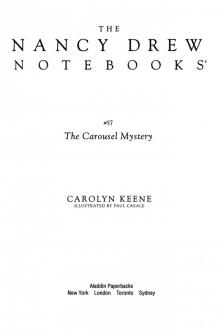 The Carousel Mystery
The Carousel Mystery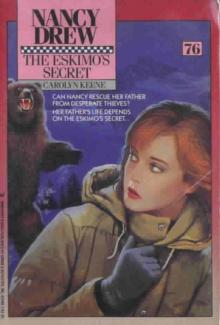 The Eskimo's Secret
The Eskimo's Secret Thrill on the Hill
Thrill on the Hill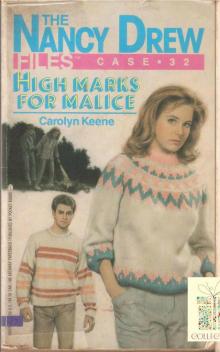 032 High Marks for Malice
032 High Marks for Malice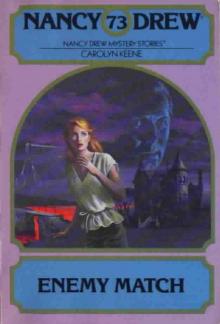 Enemy Match
Enemy Match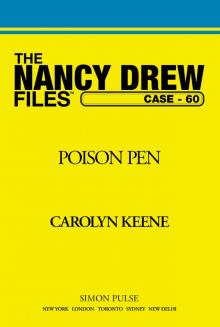 Poison Pen
Poison Pen Lights, Camera . . . Cats!
Lights, Camera . . . Cats! Lost in the Everglades
Lost in the Everglades Strike-Out Scare
Strike-Out Scare Third-Grade Reporter
Third-Grade Reporter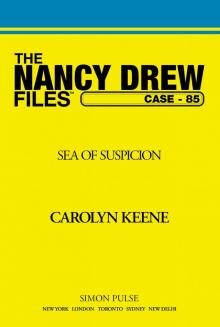 Sea of Suspicion
Sea of Suspicion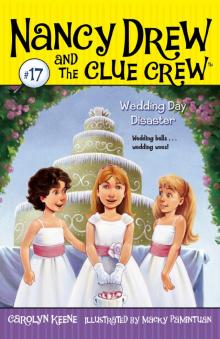 Wedding Day Disaster
Wedding Day Disaster The Make-A-Pet Mystery
The Make-A-Pet Mystery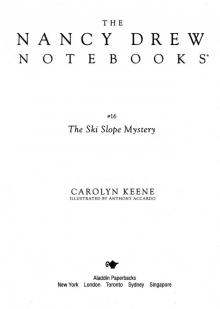 The Ski Slope Mystery
The Ski Slope Mystery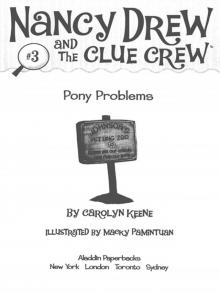 Pony Problems
Pony Problems Candy Kingdom Chaos
Candy Kingdom Chaos The Sign in the Smoke
The Sign in the Smoke The Wrong Chemistry
The Wrong Chemistry Circus Act
Circus Act Sinister Paradise
Sinister Paradise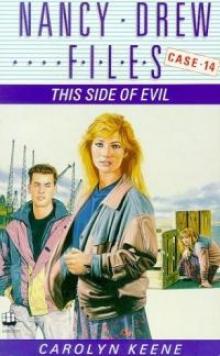 This Side of Evil
This Side of Evil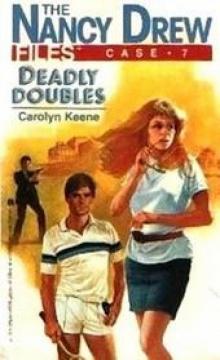 Deadly Doubles
Deadly Doubles The Mystery of the Masked Rider
The Mystery of the Masked Rider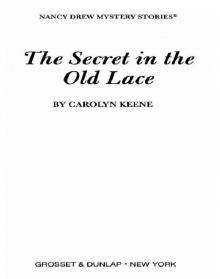 The Secret in the Old Lace
The Secret in the Old Lace The Pen Pal Puzzle
The Pen Pal Puzzle Without a Trace
Without a Trace Whose Pet Is Best?
Whose Pet Is Best?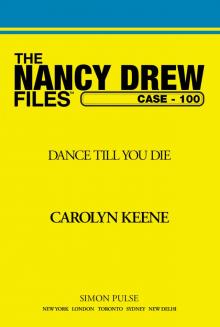 Dance Till You Die
Dance Till You Die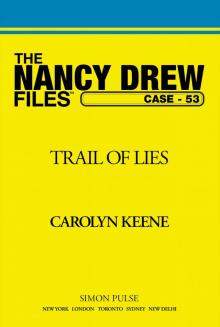 Trail of Lies
Trail of Lies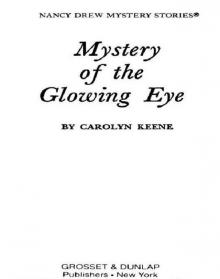 Mystery of the Glowing Eye
Mystery of the Glowing Eye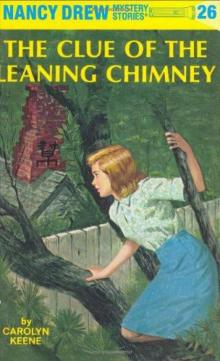 The Clue of the Leaning Chimney
The Clue of the Leaning Chimney The Crook Who Took the Book
The Crook Who Took the Book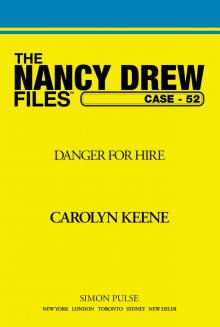 Danger for Hire
Danger for Hire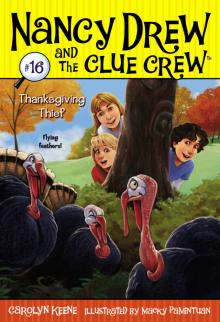 Thanksgiving Thief
Thanksgiving Thief Intruder!
Intruder!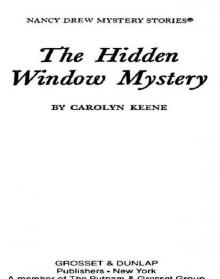 The Hidden Window Mystery
The Hidden Window Mystery Win, Place or Die
Win, Place or Die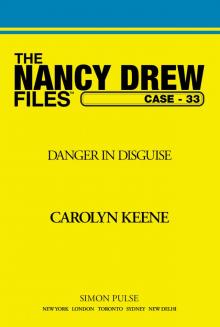 Danger in Disguise
Danger in Disguise The Best Detective
The Best Detective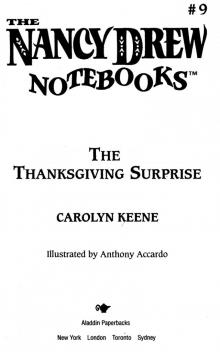 The Thanksgiving Surprise
The Thanksgiving Surprise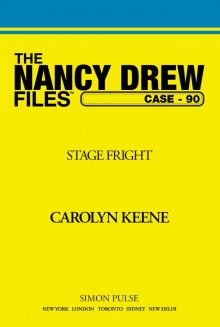 Stage Fright
Stage Fright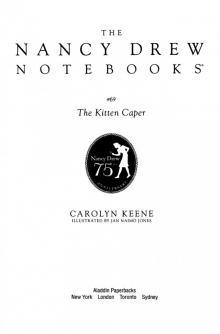 The Kitten Caper
The Kitten Caper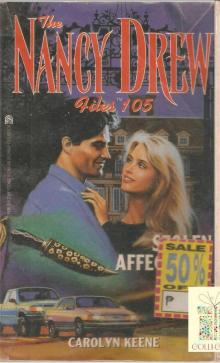 Stolen Affections
Stolen Affections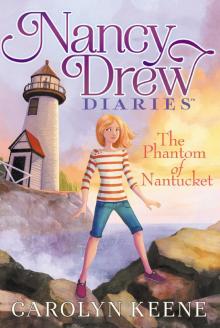 The Phantom of Nantucket
The Phantom of Nantucket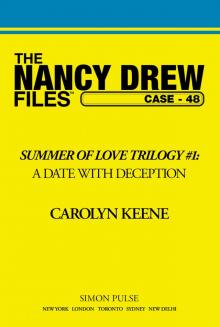 Date With Deception
Date With Deception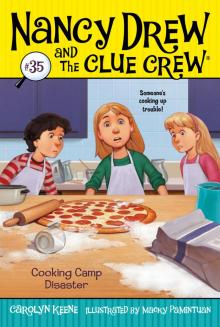 Cooking Camp Disaster
Cooking Camp Disaster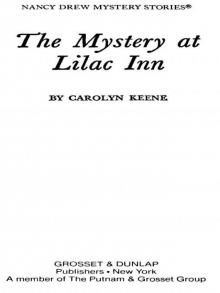 The Mystery at Lilac Inn
The Mystery at Lilac Inn Springtime Crime
Springtime Crime Action!
Action! Into Thin Air
Into Thin Air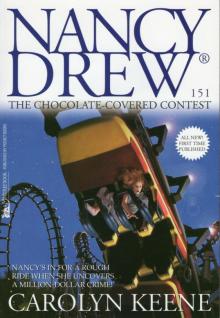 The Chocolate-Covered Contest
The Chocolate-Covered Contest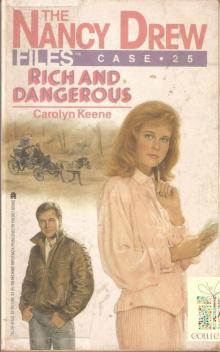 025 Rich and Dangerous
025 Rich and Dangerous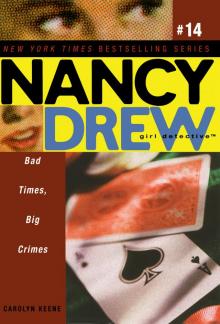 Bad Times, Big Crimes
Bad Times, Big Crimes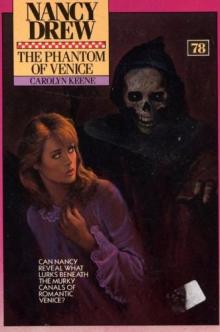 078 The Phantom Of Venice
078 The Phantom Of Venice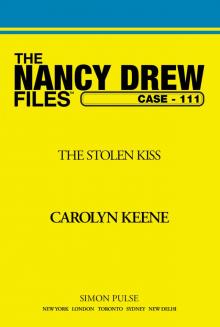 The Stolen Kiss
The Stolen Kiss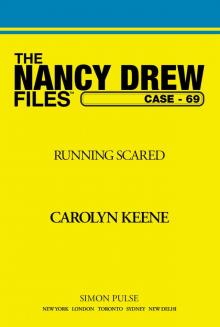 Running Scared
Running Scared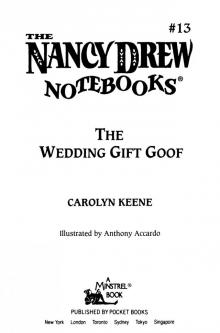 The Wedding Gift Goof
The Wedding Gift Goof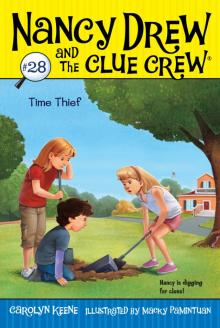 Time Thief
Time Thief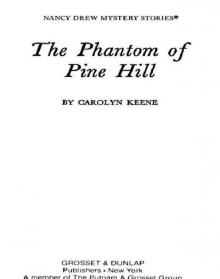 The Phantom of Pine Hill
The Phantom of Pine Hill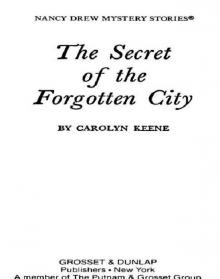 The Secret of the Forgotten City
The Secret of the Forgotten City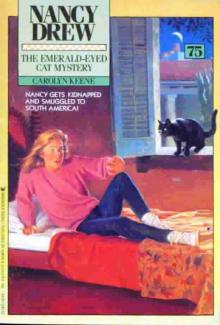 The Emerald-Eyed Cat Mystery
The Emerald-Eyed Cat Mystery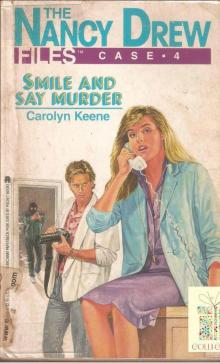 004 Smile and Say Murder
004 Smile and Say Murder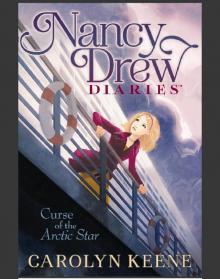 Curse of the Arctic Star
Curse of the Arctic Star Dinosaur Alert!
Dinosaur Alert!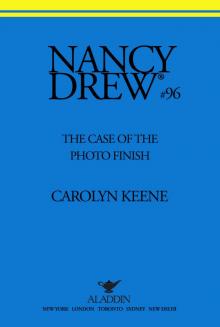 The Case of the Photo Finish
The Case of the Photo Finish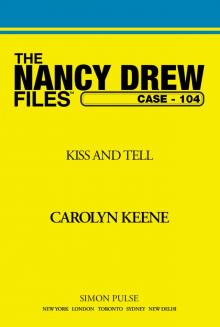 Kiss and Tell
Kiss and Tell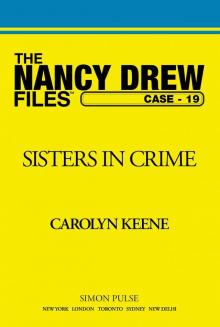 Sisters in Crime
Sisters in Crime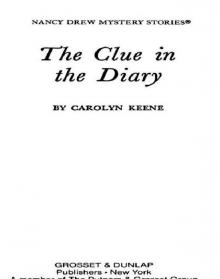 The Clue in the Diary
The Clue in the Diary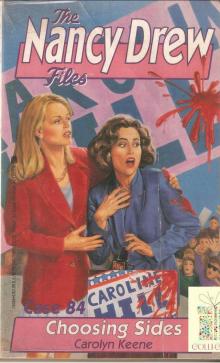 084 Choosing Sides
084 Choosing Sides Haunting of Horse Island
Haunting of Horse Island Vanishing Act
Vanishing Act The Big Island Burglary
The Big Island Burglary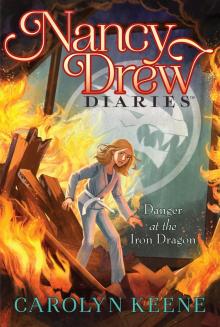 Danger at the Iron Dragon
Danger at the Iron Dragon Pets on Parade
Pets on Parade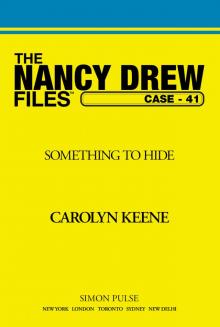 Something to Hide
Something to Hide The Strange Message in the Parchment
The Strange Message in the Parchment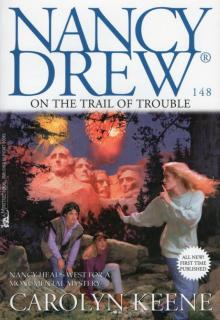 On the Trail of Trouble
On the Trail of Trouble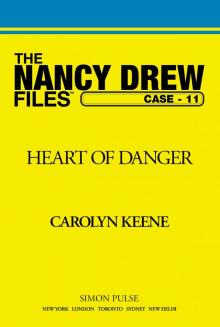 Heart of Danger
Heart of Danger The Snowman Surprise
The Snowman Surprise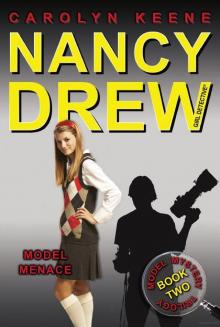 Model Menace
Model Menace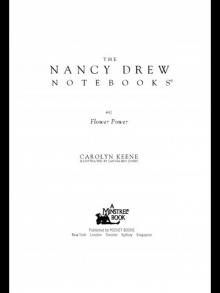 Flower Power
Flower Power The Great Goat Gaffe
The Great Goat Gaffe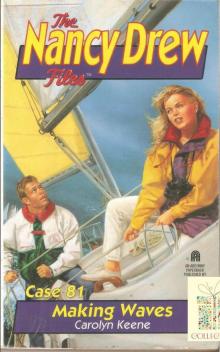 081 Making Waves
081 Making Waves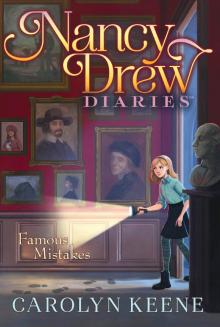 Famous Mistakes
Famous Mistakes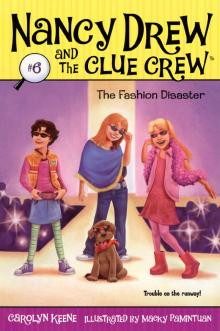 The Fashion Disaster
The Fashion Disaster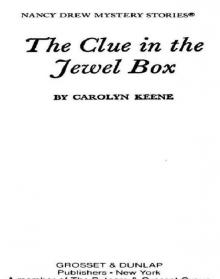 The Clue in the Jewel Box
The Clue in the Jewel Box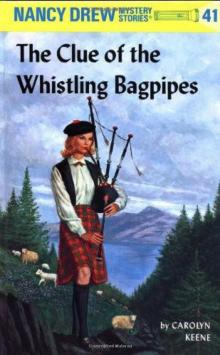 The Clue of the Whistling Bagpipes
The Clue of the Whistling Bagpipes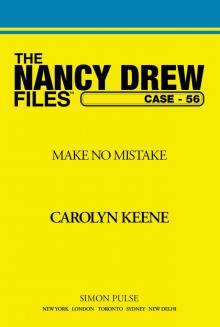 Make No Mistake
Make No Mistake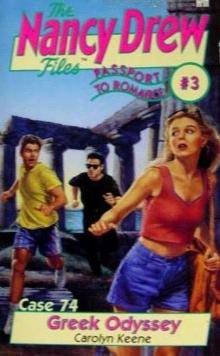 Greek Odyssey
Greek Odyssey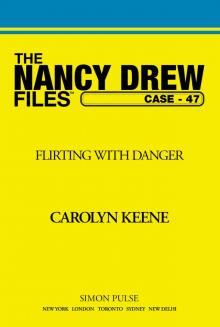 Flirting With Danger
Flirting With Danger Double Take
Double Take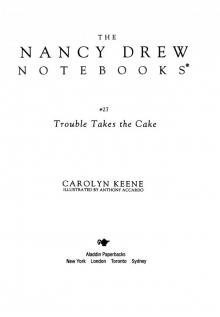 Trouble Takes the Cake
Trouble Takes the Cake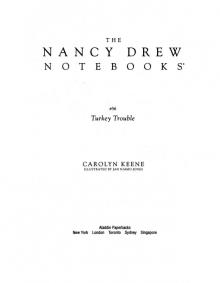 Turkey Trouble
Turkey Trouble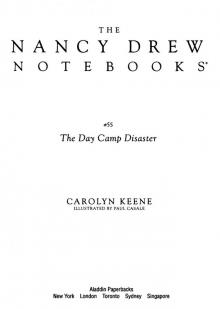 The Day Camp Disaster
The Day Camp Disaster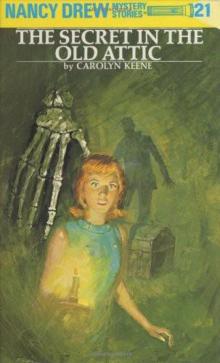 The Secret in the Old Attic
The Secret in the Old Attic The Baby-Sitter Burglaries
The Baby-Sitter Burglaries Recipe for Murder
Recipe for Murder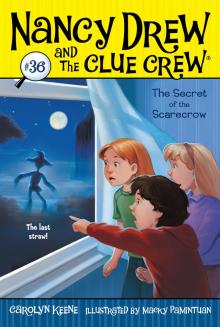 The Secret of the Scarecrow
The Secret of the Scarecrow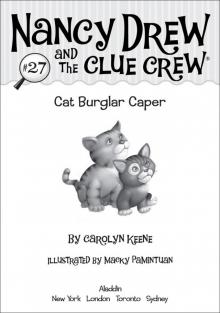 Cat Burglar Caper
Cat Burglar Caper Turkey Trot Plot
Turkey Trot Plot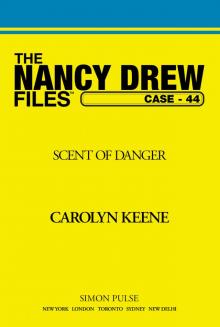 Scent of Danger
Scent of Danger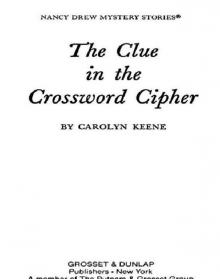 The Clue in the Crossword Cipher
The Clue in the Crossword Cipher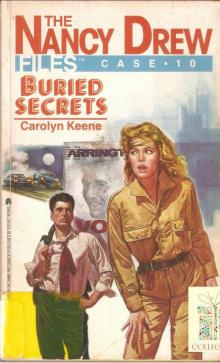 010 Buried Secrets
010 Buried Secrets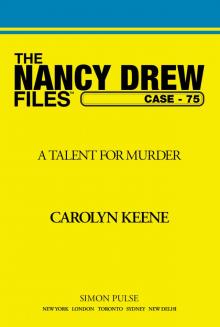 A Talent for Murder
A Talent for Murder The Triple Hoax
The Triple Hoax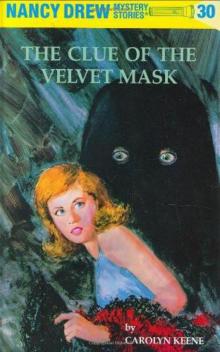 The Clue of the Velvet Mask
The Clue of the Velvet Mask Last Lemonade Standing
Last Lemonade Standing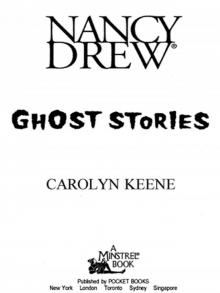 The Ghost of Blackwood Hall
The Ghost of Blackwood Hall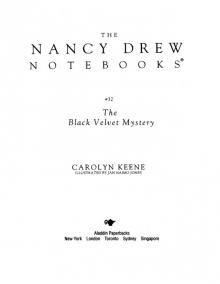 The Black Velvet Mystery
The Black Velvet Mystery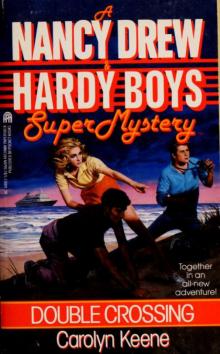 Double Crossing
Double Crossing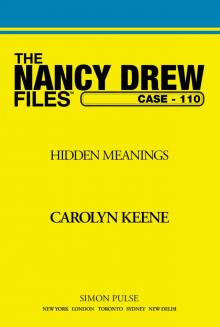 Hidden Meanings
Hidden Meanings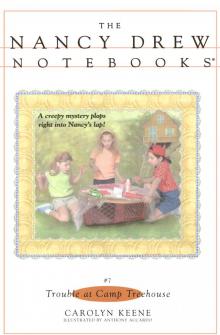 Trouble at Camp Treehouse
Trouble at Camp Treehouse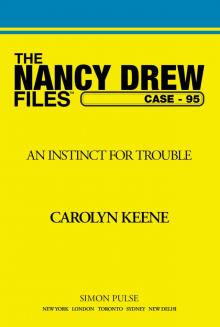 An Instinct for Trouble
An Instinct for Trouble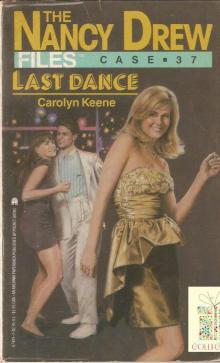 037 Last Dance
037 Last Dance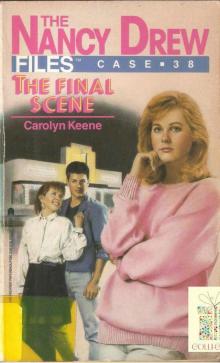 038 The Final Scene
038 The Final Scene Duck Derby Debacle
Duck Derby Debacle The Pumpkin Patch Puzzle
The Pumpkin Patch Puzzle Hidden Pictures
Hidden Pictures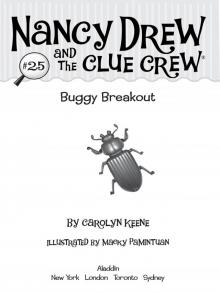 Buggy Breakout
Buggy Breakout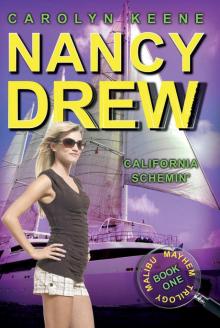 California Schemin'
California Schemin'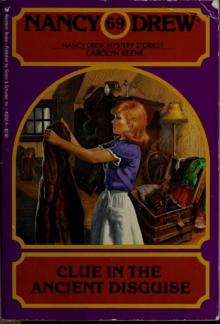 Clue in the Ancient Disguise
Clue in the Ancient Disguise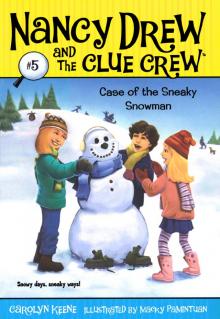 Case of the Sneaky Snowman
Case of the Sneaky Snowman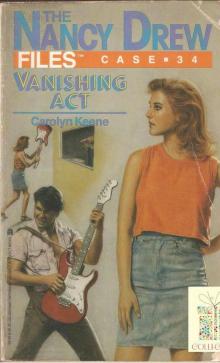 034 Vanishing Act
034 Vanishing Act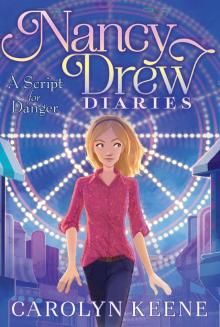 A Script for Danger
A Script for Danger The Flower Show Fiasco
The Flower Show Fiasco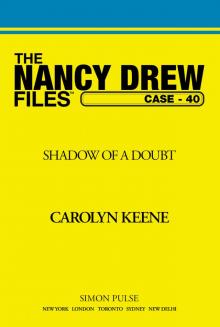 Shadow of a Doubt
Shadow of a Doubt Easy Marks
Easy Marks Alien in the Classroom
Alien in the Classroom Ghost Stories, #2 (Nancy Drew)
Ghost Stories, #2 (Nancy Drew) The Bike Race Mystery
The Bike Race Mystery False Pretenses
False Pretenses The Kachina Doll Mystery
The Kachina Doll Mystery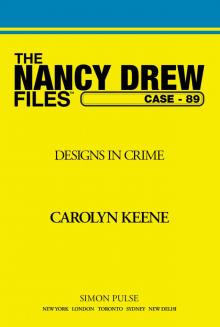 Designs in Crime
Designs in Crime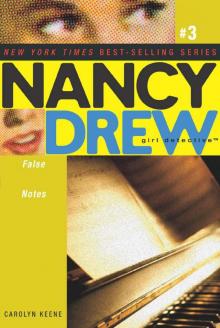 False Notes
False Notes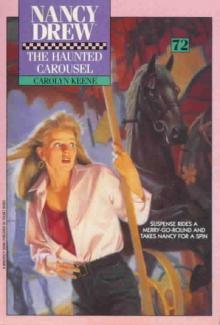 The Haunted Carousel
The Haunted Carousel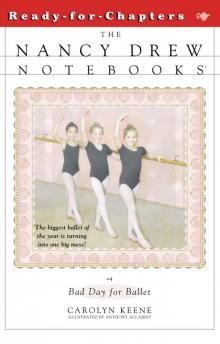 Bad Day for Ballet
Bad Day for Ballet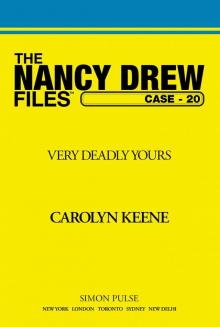 Very Deadly Yours
Very Deadly Yours The Fine-Feathered Mystery
The Fine-Feathered Mystery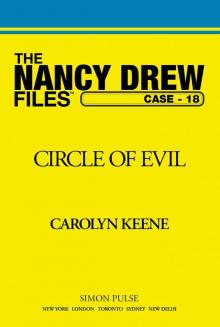 Circle of Evil
Circle of Evil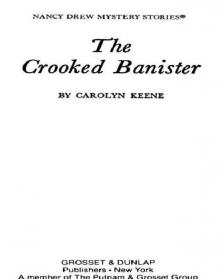 The Crooked Banister
The Crooked Banister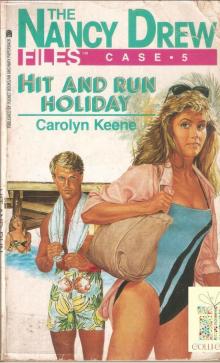 005 Hit and Run Holiday
005 Hit and Run Holiday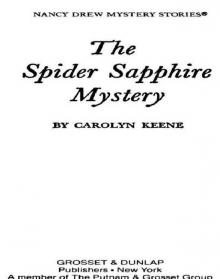 The Spider Sapphire Mystery
The Spider Sapphire Mystery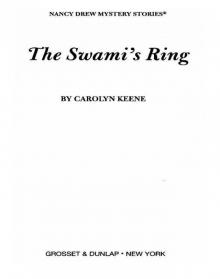 The Swami's Ring
The Swami's Ring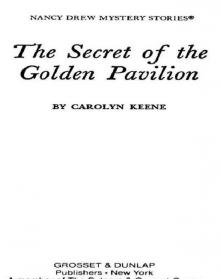 The Secret of the Golden Pavilion
The Secret of the Golden Pavilion Recipe for Trouble
Recipe for Trouble Betrayed by Love
Betrayed by Love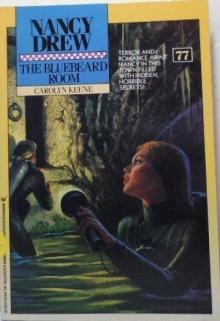 The Bluebeard Room
The Bluebeard Room Sweet Revenge
Sweet Revenge Illusions of Evil
Illusions of Evil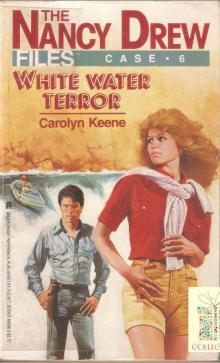 006 White Water Terror
006 White Water Terror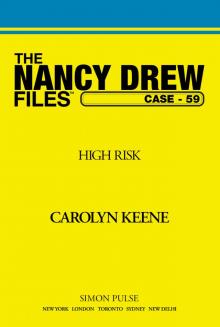 High Risk
High Risk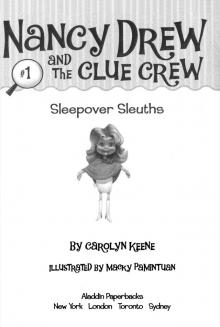 Sleepover Sleuths
Sleepover Sleuths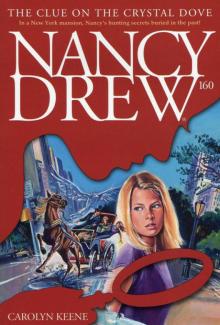 The Clue on the Crystal Dove
The Clue on the Crystal Dove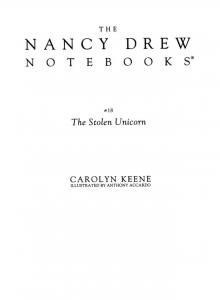 The Stolen Unicorn
The Stolen Unicorn The Professor and the Puzzle
The Professor and the Puzzle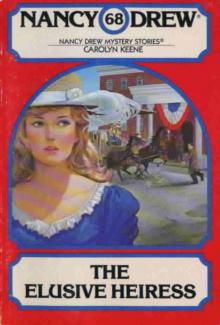 The Elusive Heiress
The Elusive Heiress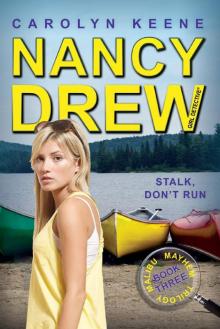 Stalk, Don't Run
Stalk, Don't Run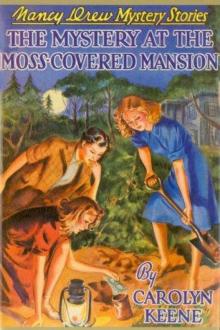 The Mystery at the Moss-Covered Mansion
The Mystery at the Moss-Covered Mansion The Tortoise and the Scare
The Tortoise and the Scare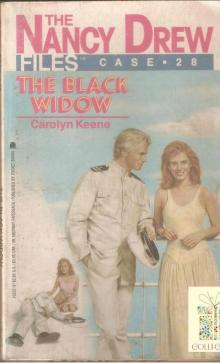 028 The Black Widow
028 The Black Widow Big Worry in Wonderland
Big Worry in Wonderland Crosscurrents
Crosscurrents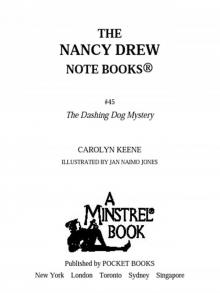 The Dashing Dog Mystery
The Dashing Dog Mystery Fatal Attraction
Fatal Attraction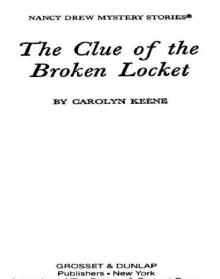 The Clue of the Broken Locket
The Clue of the Broken Locket The Stinky Cheese Surprise
The Stinky Cheese Surprise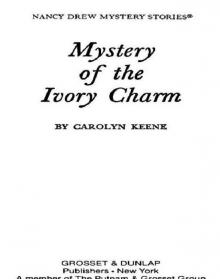 Mystery of the Ivory Charm
Mystery of the Ivory Charm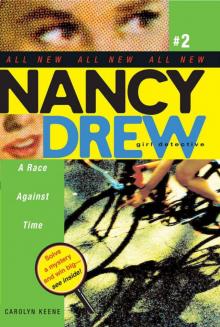 A Race Against Time
A Race Against Time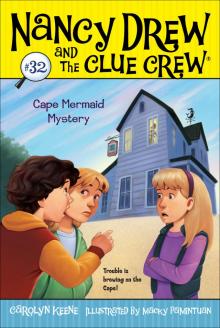 Cape Mermaid Mystery
Cape Mermaid Mystery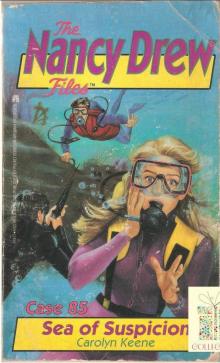 085 Sea of Suspicion
085 Sea of Suspicion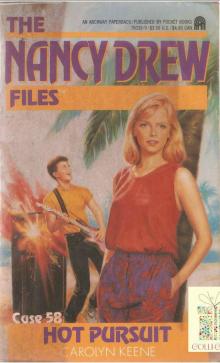 058 Hot Pursuit
058 Hot Pursuit The Secret in the Spooky Woods
The Secret in the Spooky Woods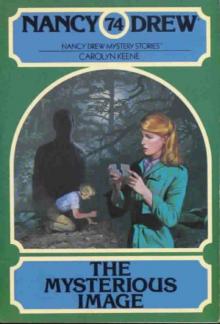 The Mysterious Image
The Mysterious Image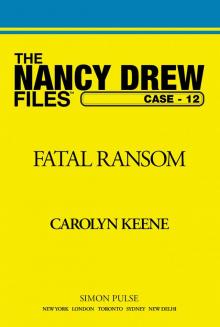 Fatal Ransom
Fatal Ransom The Stolen Show
The Stolen Show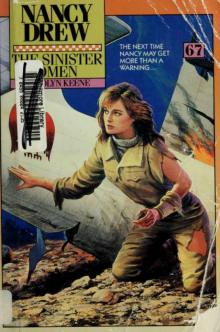 The Sinister Omen
The Sinister Omen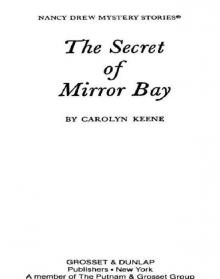 The Secret of Mirror Bay
The Secret of Mirror Bay Rendezvous in Rome
Rendezvous in Rome The Perfect Plot
The Perfect Plot The Mystery of Misty Canyon
The Mystery of Misty Canyon Nancy's Mysterious Letter
Nancy's Mysterious Letter The Snow Queen's Surprise
The Snow Queen's Surprise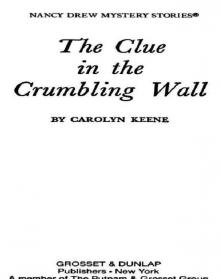 The Clue in the Crumbling Wall
The Clue in the Crumbling Wall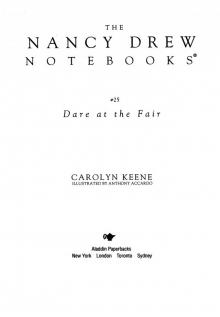 Dare at the Fair
Dare at the Fair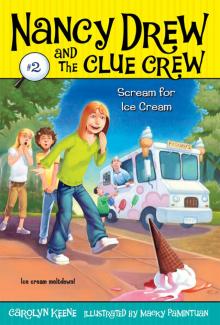 Scream for Ice Cream
Scream for Ice Cream A Star Witness
A Star Witness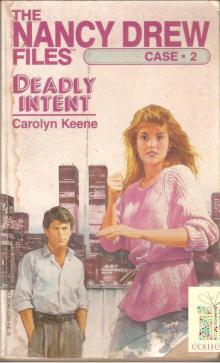 002 Deadly Intent
002 Deadly Intent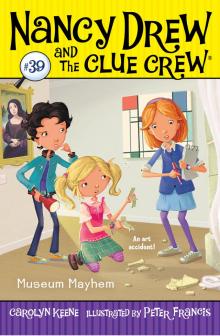 Museum Mayhem
Museum Mayhem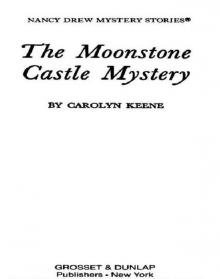 The Moonstone Castle Mystery
The Moonstone Castle Mystery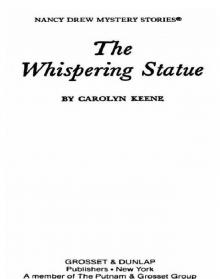 The Whispering Statue
The Whispering Statue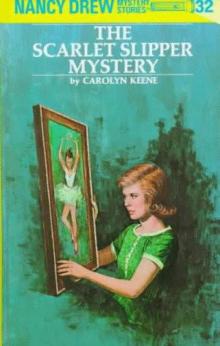 The Scarlet Slipper Mystery
The Scarlet Slipper Mystery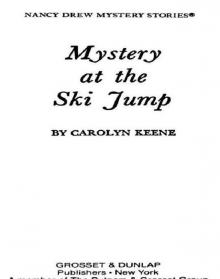 Mystery at the Ski Jump
Mystery at the Ski Jump Hot Pursuit
Hot Pursuit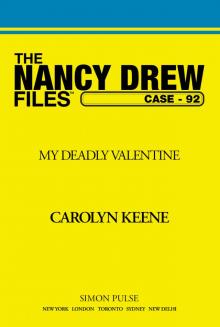 My Deadly Valentine
My Deadly Valentine The Silent Suspect
The Silent Suspect Deep Secrets
Deep Secrets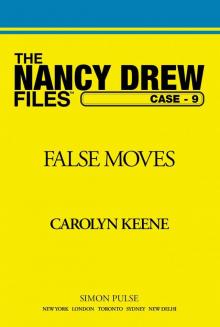 False Moves
False Moves The Zoo Crew
The Zoo Crew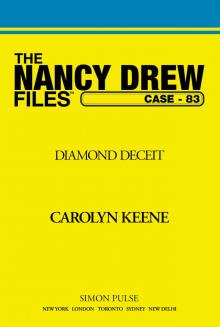 Diamond Deceit
Diamond Deceit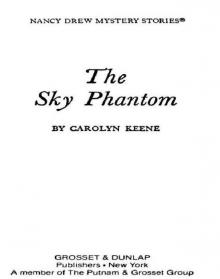 The Sky Phantom
The Sky Phantom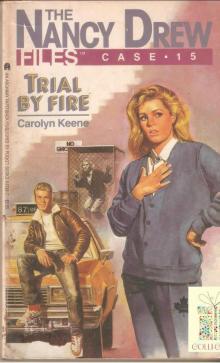 015 Trial by Fire
015 Trial by Fire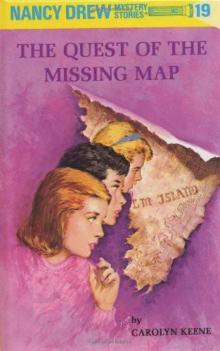 The Quest of the Missing Map
The Quest of the Missing Map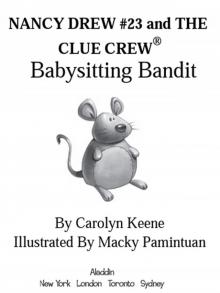 Babysitting Bandit
Babysitting Bandit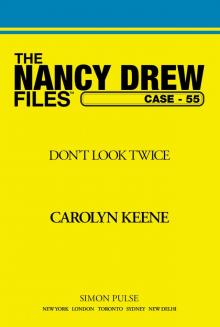 Don't Look Twice
Don't Look Twice Never Say Die
Never Say Die The Soccer Shoe Clue
The Soccer Shoe Clue Pool Party Puzzler
Pool Party Puzzler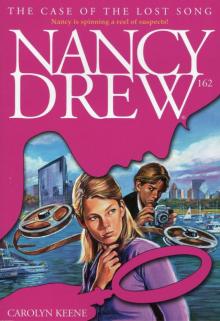 The Case of the Lost Song
The Case of the Lost Song The Apple Bandit
The Apple Bandit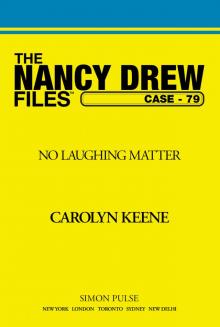 No Laughing Matter
No Laughing Matter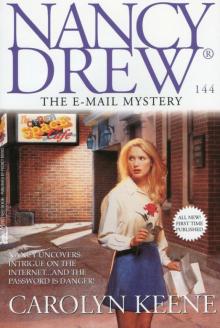 The Thirteenth Pearl
The Thirteenth Pearl Sabotage at Willow Woods
Sabotage at Willow Woods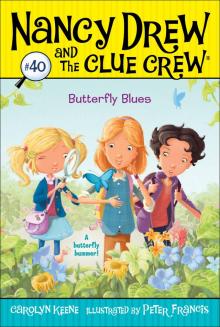 Butterfly Blues
Butterfly Blues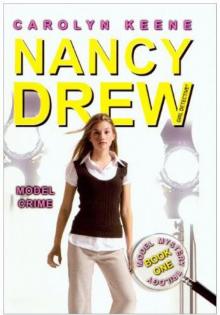 Model Crime 1
Model Crime 1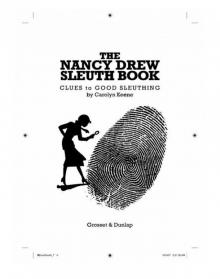 The Nancy Drew Sleuth Book
The Nancy Drew Sleuth Book Mystery by Moonlight
Mystery by Moonlight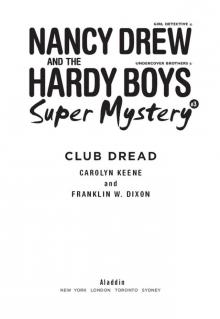 Club Dread
Club Dread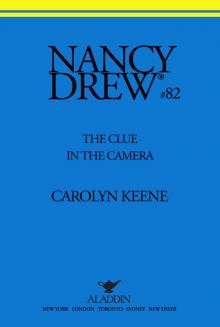 The Clue in the Camera
The Clue in the Camera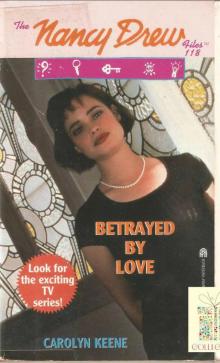 118 Betrayed By Love
118 Betrayed By Love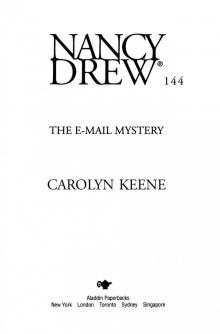 The E-Mail Mystery (Nancy Drew Book 144)
The E-Mail Mystery (Nancy Drew Book 144)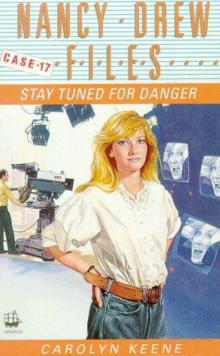 Stay Tuned for Danger: Circle of Evil
Stay Tuned for Danger: Circle of Evil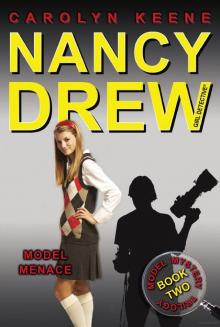 Model Menace 2
Model Menace 2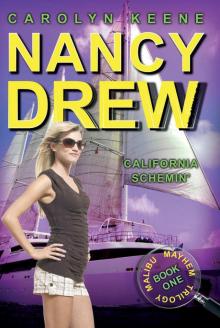 California Schemin': Book One in the Malibu Mayhem Trilogy
California Schemin': Book One in the Malibu Mayhem Trilogy Zoo Clue (Nancy Drew Notebooks)
Zoo Clue (Nancy Drew Notebooks)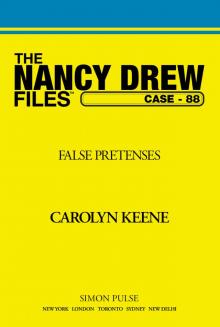 False Pretences
False Pretences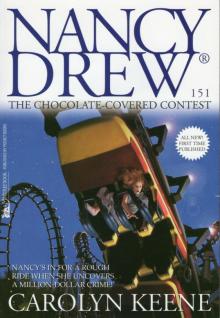 151 The Chocolate-Covered Contest
151 The Chocolate-Covered Contest Close Encounters
Close Encounters The Emeral-Eyed Cat Mystery
The Emeral-Eyed Cat Mystery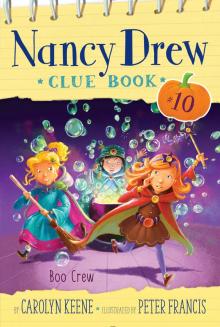 Boo Crew
Boo Crew The Message in the Haunted Mansion (Nancy Drew Book 122)
The Message in the Haunted Mansion (Nancy Drew Book 122) A Nancy Drew Christmas
A Nancy Drew Christmas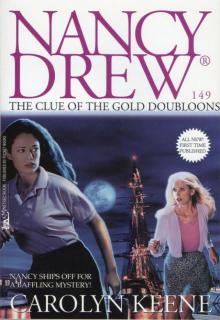 149 The Clue Of The Gold Doubloons
149 The Clue Of The Gold Doubloons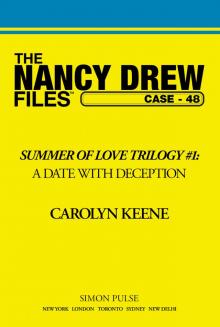 A Date with Deception
A Date with Deception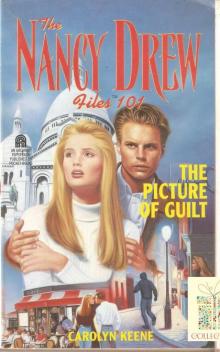 101 The Picture of Guilt
101 The Picture of Guilt The Secret in the Spooky Woods (Nancy Drew Notebooks Book 62)
The Secret in the Spooky Woods (Nancy Drew Notebooks Book 62) The Wrong Track
The Wrong Track Lights! Camera! Clues!
Lights! Camera! Clues! The Vanishing Act
The Vanishing Act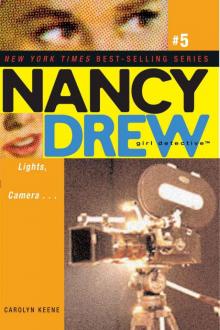 Lights, Camera . . .
Lights, Camera . . . Model Suspect 3
Model Suspect 3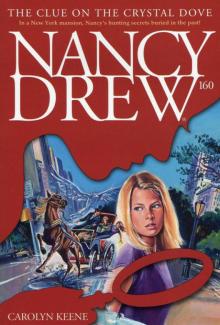 160 The Clue On The Crystal Dove
160 The Clue On The Crystal Dove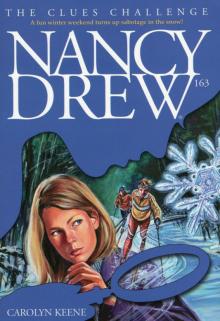 163 The Clues Challenge
163 The Clues Challenge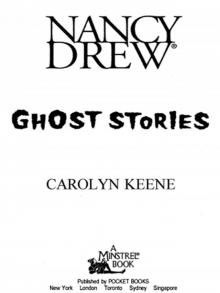 Ghost Stories (Nancy Drew)
Ghost Stories (Nancy Drew) Space Case (Nancy Drew Notebooks Book 61)
Space Case (Nancy Drew Notebooks Book 61)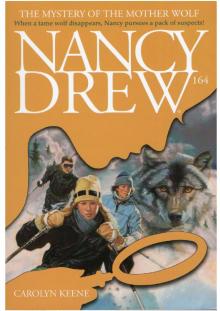 164 The Mystery Of The Mother Wolf
164 The Mystery Of The Mother Wolf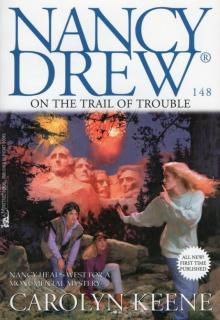 148 On The Trail Of Trouble
148 On The Trail Of Trouble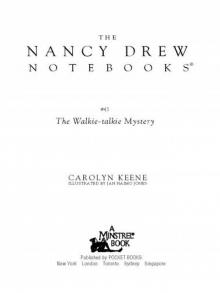 The Walkie-Talkie Mystery
The Walkie-Talkie Mystery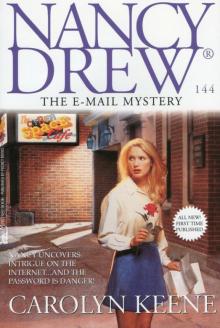 The E-Mail Mystery
The E-Mail Mystery Intruder (Nancy Drew (All New) Girl Detective)
Intruder (Nancy Drew (All New) Girl Detective)![The Stolen Relic [Nancy Drew Girl Detective 007] Read online](http://i1.bookreadfree.com/i2/04/11/the_stolen_relic_nancy_drew_girl_detective_007_preview.jpg) The Stolen Relic [Nancy Drew Girl Detective 007]
The Stolen Relic [Nancy Drew Girl Detective 007]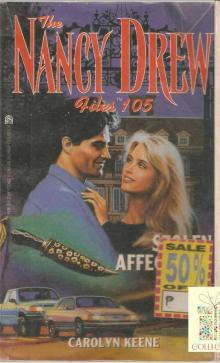 105 Stolen Affections
105 Stolen Affections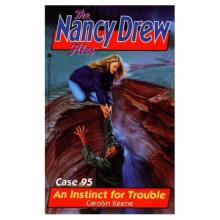 An Instict for Trouble
An Instict for Trouble 161 Lost In The Everglades
161 Lost In The Everglades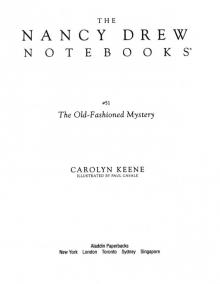 The Old-Fashioned Mystery
The Old-Fashioned Mystery Perfect Plot
Perfect Plot